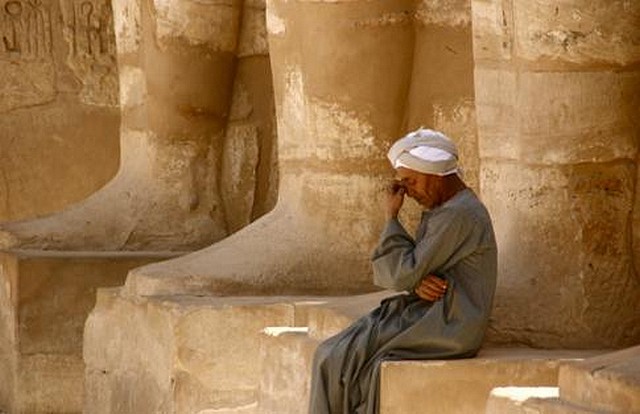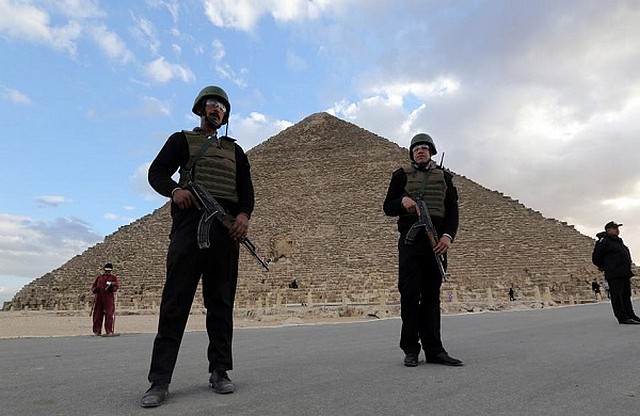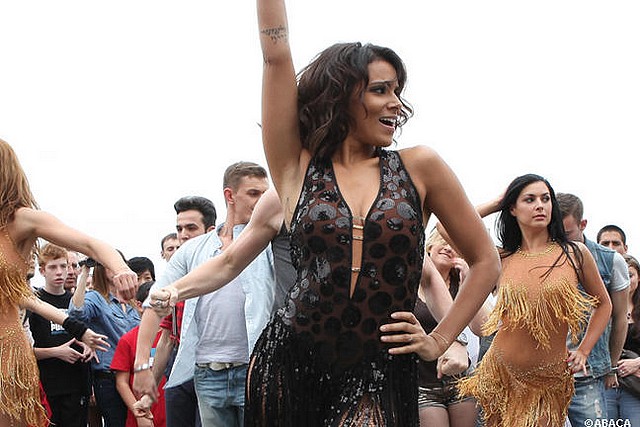At the Red Sea or in front of the pyramids, tourists are making a promising return to Egypt, after years of political instability enamelled with terrorist attacks.
This improvement comes at a time when Abdel Fattah al-Sissi, who has made the return to stability and growth a priority, must win a second term in the presidential elections at the end of March.
 [1]Away from Cairo, in the seaside city of Hurghada (east), foreign tourists once again bask in front of a turquoise blue sea, while boats embark groups of divers.
[1]Away from Cairo, in the seaside city of Hurghada (east), foreign tourists once again bask in front of a turquoise blue sea, while boats embark groups of divers.
With 75 visits, Bent Skovboe, a 77-year-old Dane, is a regular. « Even if there were only (…) diving, I would come. But they also have pyramids in Cairo, temples in Luxor, the Nile and Aswan, and people are very warm , » he said, wearing bathing suits and sunglasses.
 [2]Tourists, hoteliers or local shopkeepers are delighted with the increase in bookings and occupancy rates, particularly on the shores of the Red Sea, as in Hourghada.
[2]Tourists, hoteliers or local shopkeepers are delighted with the increase in bookings and occupancy rates, particularly on the shores of the Red Sea, as in Hourghada.
« Demand for Egypt is very strong, especially in the German market, » confirms Ali Okda, CEO of Travco Travel Company, a local partner of TUI, the world’s largest travel and tourism company.
Marc Zafra, manager at LuxairTours, the Luxembourg tour operator, claims a »increase of 250% » in bookings over one year.
The end of a bad cycle
The setbacks of Egyptian tourism began in the chaos that followed the 2011 popular uprising and the fall of President Hosni Mubarak.
 [3]Then, in October 2015, the industry was further affected by the attack on a Russian plane transporting holidaymakers from Sharm el-Sheikh, which claimed the lives of 224 people. The Islamic State (EI) group claimed responsibility for the attack, and Moscow banned direct flights to Egypt.
[3]Then, in October 2015, the industry was further affected by the attack on a Russian plane transporting holidaymakers from Sharm el-Sheikh, which claimed the lives of 224 people. The Islamic State (EI) group claimed responsibility for the attack, and Moscow banned direct flights to Egypt.
The following year » was one of the worst for tourism, » says Hisham El Demery, president of the Tourism Promotion Office.
In 2016, Egypt welcomed 5.4 million tourists, compared to 14.7 million in 2010, the reference year.
The shortfall was massive, with 3.8 billion dollars in revenues in 2016 against 12.5 billion in 2010.
This dramatic fall was a huge blow to the country in one of the worst economic crises in its history.
The return finally began in 2017, with 8.3 million visitors, before being confirmed at the beginning of this year.
 [4]This situation will only last if there is no »a large-scale terrorist incident« , says Mostafa Kamel al-Sayed, professor of political science at Cairo University.
[4]This situation will only last if there is no »a large-scale terrorist incident« , says Mostafa Kamel al-Sayed, professor of political science at Cairo University.
Still present in the country, the EI promised to attack tourists again.
To date, this upturn in tourism is good news for President Sissi, who has made the fight against terrorism and economic recovery a priority.
It is not enough, however, to make it a campaign argument for the outgoing president’s camp, sure of its success during the elections of 26, 27, 28 March – he will face only a modest and only opponent, Moussa Mostafa Moussa.
For their part, tourism professionals want to show their optimism for the future, arguing that the crisis has led them to build a more robust industry, with a diversification of their clientele.
Following the Russian ban, »many (…) have improved their services, » adds Faisal Khalaf, owner of the diving company Red Sea Explorers.
According to Mohamed Aboustate, director geography
